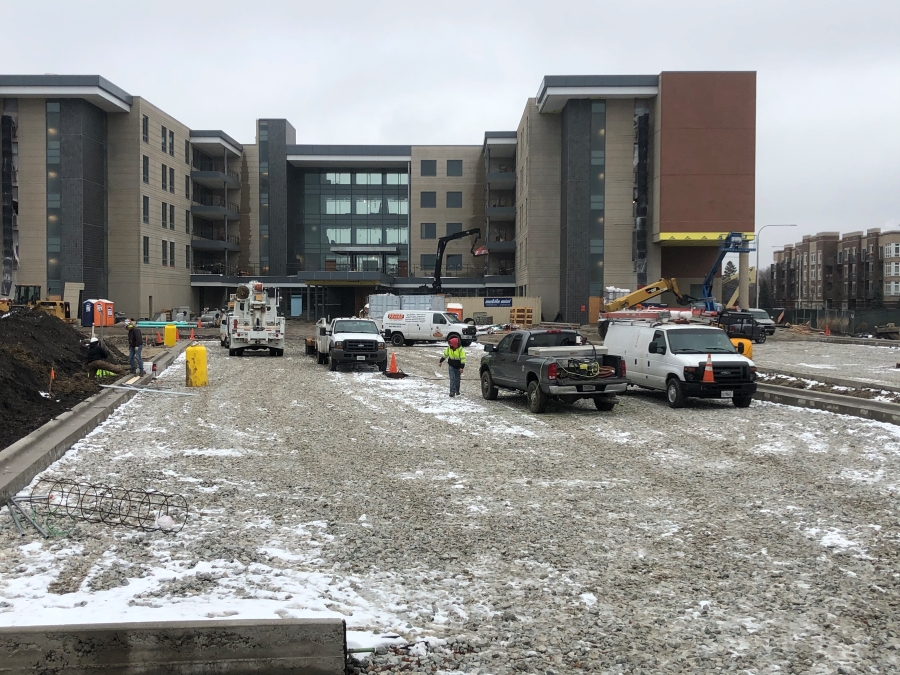As COVID-19 cases in Illinois rise to more than 5,000 with 73 deaths, state officials and the U.S. Army Corps of Engineers announced that Chicago's McCormick Place, the largest convention center in North America, would be converted to a hospital to handle some patients. Another project, the Chicago Veterans Home, has been fast-tracked from its original summer completion date.
[For ENR’s latest coverage of the impacts of the COVID-19 pandemic, click here]
Gov. J.B. Pritzker announced that the convention center will have 500 beds available by April 5. The planned emergency hospital, which is being called an alternate care facility, will eventually hold 3,000 beds for patients, most of whom display mild symptoms and would not require intensive care.
Another group of 500 beds is planned to be available April 17, with 1,250 more by April 24.
The final 750 beds are being planned for McCormick Place's Hall B as acute care beds for patients exhibiting more severe symptoms and those will be in place by the end of April, Pritzker said.
“Based on best practices around the world on how to manage positive cases and contain this virus, McCormick Place will be dedicated mostly to non-acute COVID-19 patients, people who could benefit from the care of medical professionals but are not likely to need a formal ICU,” Pritzker said at his daily news briefing.
Lt. General Todd T. Semonite, Corps chief of engineers and commanding general, said at a Pentagon press conference March 28 that the ability of Hall B to perform like a hospital was necessary for the 750 acute care beds.
“The ability to do negative pressure in a hotel room is pretty easy," Semonite said. "But when you go into a giant voluminous room like a convention center, to try and bring the pressure down, we didn't think it was attainable, [but] McCormick Place’s infrastructure—with water, electricity and sewage service easily accessible—makes it possible to set up a medical facility there."
Pritzker did not say which government agency will take charge of the site or how it will be staffed, but the state has asked the Federal Emergency Management Agency for assistance and volunteers are being sought on McCormick Place's website.
"In [McCormick Place halls] C and A, we're bringing the pressure down in the entire convention center, it's going to be lower pressure, it keeps the containment in," Semonite said. "But in hall B, what they've asked us to do, is to get some type of a module, that we could set inside there."
The convention center is owned by The Metropolitan Pier and Exposition Authority, a state agency created by the Illinois General Assembly and commonly known as "McPier" because the two assets it owns are McCormick Place and nearby Navy Pier. $15 Million is being provided by FEMA to contribute to the conversion cost.
"And this is the main message you need to know — all Covid," Semonite said. "They've made a decision that in that facility, everybody that goes in there that is going to be staff, will be 100% PPE (personal protective equipment)."
Another state-owned building, the $71-million Chicago Veterans Home, had been delayed since construction began in 2012 because of a faulty foundation design by the original structural engineer and because of shutdowns over disagreements between former Gov. Bruce Rauner [R] and Illinois House Speaker Michael Madigan [D, southwest Chicago].
The facility was planned to be completed by contractor IHC Construction this summer. That changed when IHC was told to stop work on March 19, but the Illinois Dept. of Veterans Affairs changed its mind and told the contractor to speed construction of the two-tower, 200-bed facility.
“None of our other projects had been shut down, but that lasted about 12 hours,” says Joe Saftig, IHC Construction’s project manager. “The word on [March 20] was you have 21 days to complete it on an accelerated schedule. Their thinking was that in two weeks, the state is going to need any and all space they can find.”
IHC put on a second shift and is now working to get the 200-bed home done as quickly as possible. The firm brought in a cleaning crew that spends about three hours cleaning and disinfecting the space [using] ... CDC-approved protocols between shifts and at the end of the day. Other measures include spreading out the work by sending in only two trades workers per space used in the H-shaped, five-story building.
IHC had 75 trades working on the project, either IHC personnel or subcontractors before March 20, with the figure now at about 135 to accelerate the schedule.
"We've got 15 days, 10 hours, seven minutes, and 31 seconds to go [as of press time on March 31]. I've got a countdown clock in my office," Saftig says.





